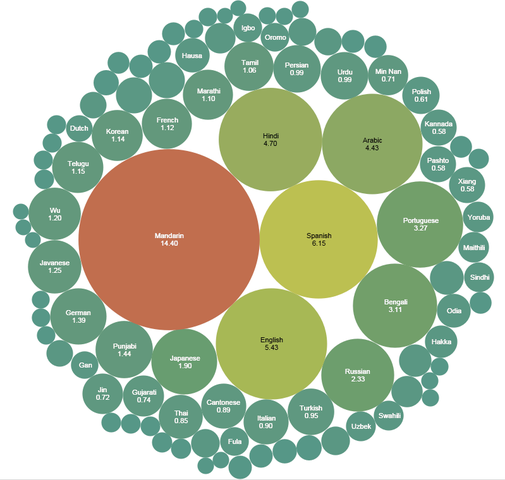Difference Between Language and Speech

List of languages by number of native speakers
Language vs Speech
Language and speech are two different communicating tools. Language is the tool by which we write, understand, etc., and speech is the tool of communication which is used to verbally communicate with others. Let us elaborate more on both to understand the differences.
Language
One of the dictionary meanings of language is the communication of feelings and thoughts through a system of particular signals, like sounds, voice, written symbols, and gestures. It is considered to be a very specialized capacity of humans where they use complex systems for communication. The study of languages is called linguistics.
There are many languages spoken today by humans. Languages have some rules, and they are compiled and used according to those rules for communication. Languages can be not only written, but sometimes some languages are based on signs only. These are called sign languages. In other cases, some particular codes are used for computers, etc. which are called computer languages or programming.
Language has four different rules which are shared socially. First, what a word means, the meaning of the words which is called vocabulary; second, how to make up new words; third, how to put the words together in a sequence and, finally, how to use the sentence in a particular situation. Does it need to be a statement, or does it need to be interrogative, etc.
Language can be either receptive, meaning understanding of a language, and expressive language, which means the usage of the language either orally or in writing. If we simplify everything, language expresses an idea communicated in the message.
Speech
One of the dictionary meanings of speech is the act of expressing or the faculty of describing feelings and thoughts or perceptions by words, something spoken or vocal communication. It is a specifically human capacity to communicate verbally or vocally with the use of syntactic combinations from diverse vocabularies.
Each word spoken has a phonetic combination of certain sound units. Speech is created by vocabularies, syntax, and a set of sound units. It is the verbal way of communicating. The following components are a part of speech:
Articulation, which means the way speech sounds are produced.
Voice, the breathing process and the vocal folds used to produce sounds.
Fluency, the rhythm required to speak without hesitation.
Simplifying the whole concept, speech expresses how a spoken message needs to be communicated.
Summary:
1.Language is the communication of feelings and thoughts through a system of particular signals like sounds, voice, written symbols, and gestures. However, speech is the act of expressing or the faculty of describing feelings and thoughts or perceptions by words, something spoken or vocal communication.
2.Languages could be human languages, sign languages, or computer languages which use codes while speech is a single concept. It is the physical process used to verbalize language.
3.Languages express the idea that needs to be communicated while speech is the process which shows how the message needs to be communicated.
- Difference Between Data Mining and Data Warehousing - October 21, 2012
- Difference Between 7-Keto DHEA and DHEA - October 20, 2012
- Difference Between Tamil and Malayalam - October 18, 2012

it was better to address for the relationship between speech and language
It’s a shame you don’t have a donate button! I’d without a doubt
donate to this fantastic blog! I guess for now i’ll settle for book-marking and adding your RSS feed to my Google account.
I look forward to fresh updates and will talk about this site with my
Facebook group. Talk soon!
The differences can be more specifically elaborated as a comparison and this is kind of gross. Hope to see you update it.
Very clear! Thank u